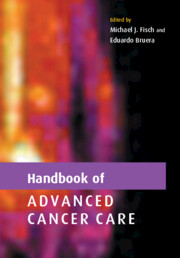Book contents
- Frontmatter
- Contents
- List of contributors
- Preface
- Acknowledgements
- PART I General concepts in oncology
- Part II Primary tumors
- Part III Management of specific symptoms and syndromes
- 41 Assessment of pain
- 42 Drugs for managing cancer pain
- 43 Difficult pain management problems
- 44 Dyspnea
- 45 Loss of appetite and weight
- 46 Fatigue
- 47 Depression and anxiety
- 48 Delirium
- 49 Constipation
- 50 Palliation of fever and sweats: the heat is on!
- 51 Bleeding in advanced cancer patients
- 52 Thrombosis
- 53 Hypercalcemia of malignancy
- 54 Lymphedema
- 55 Wound care of the advanced cancer patient
- 56 Infections in patients with advanced cancer
- 57 Urogenital complications
- 58 Brain metastases
- 59 Bowel obstruction
- 60 Bone metastases
- 61 Meningeal cancer
- 62 Pleural and pericardial effusions
- 63 Superior vena cava syndrome
- 64 Chronic nausea
- Index
- References
57 - Urogenital complications
Published online by Cambridge University Press: 04 August 2010
- Frontmatter
- Contents
- List of contributors
- Preface
- Acknowledgements
- PART I General concepts in oncology
- Part II Primary tumors
- Part III Management of specific symptoms and syndromes
- 41 Assessment of pain
- 42 Drugs for managing cancer pain
- 43 Difficult pain management problems
- 44 Dyspnea
- 45 Loss of appetite and weight
- 46 Fatigue
- 47 Depression and anxiety
- 48 Delirium
- 49 Constipation
- 50 Palliation of fever and sweats: the heat is on!
- 51 Bleeding in advanced cancer patients
- 52 Thrombosis
- 53 Hypercalcemia of malignancy
- 54 Lymphedema
- 55 Wound care of the advanced cancer patient
- 56 Infections in patients with advanced cancer
- 57 Urogenital complications
- 58 Brain metastases
- 59 Bowel obstruction
- 60 Bone metastases
- 61 Meningeal cancer
- 62 Pleural and pericardial effusions
- 63 Superior vena cava syndrome
- 64 Chronic nausea
- Index
- References
Summary
Introduction
Genitourinary and other primary malignancies cause frequent and common urogenital complications. Healthcare providers need to be cognizant of these unique problems inherent in treating cancer patients. In this chapter, we will discuss the most common urogenital complications of patients with cancer.
Ureteral obstruction
Primary malignancies can spread from their original location to the retroperitoneum and lead to ureteral obstruction. The obstruction typically occurs from either direct extension from the tumor itself or metastases to the retroperitoneal lymph nodes. Malignancies originating from the genitourinary system are the most common cause of ureteral obstruction in patients with cancer. However, other malignant tumors can be culprits (Table 57.1). Additionally, other therapies such as radiation therapy can result in ureteral obstruction.
Patients with ureteral obstruction typically present with flank pain, oliguria, or azotemia. Renal sonography, abdominal-pelvic computed tomography (CT) scan, or intravenous pyelogram (IVP) usually demonstrate unilateral or bilateral hydronephrosis in patients with significant ureteral obstruction.
Internal double-J stents, placed in a retrograde fashion through the bladder and into the renal pelvis, usually relieve the obstruction. Occasionally, significant retroperitoneal disease precludes the placement of internal stents. In these situations, percutaneous nephrostomy tubes placed into the kidneys relieve the obstruction.
Patients may exhibit a marked polyuria following the relief of bilateral ureteral obstruction. This postobstructive diuresis is usually physiologic and self-limited. If the polyuria is persistent and associated with elevation of serum creatinine and blood urea nitrogen (BUN), the patient needs aggressive monitoring of urine output, blood pressure, intravenous fluids, and serum electrolytes.
- Type
- Chapter
- Information
- Handbook of Advanced Cancer Care , pp. 450 - 453Publisher: Cambridge University PressPrint publication year: 2003



